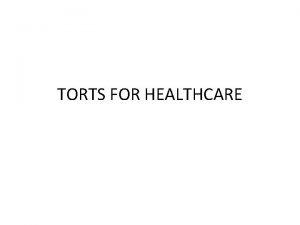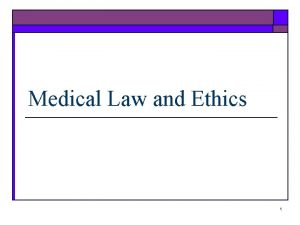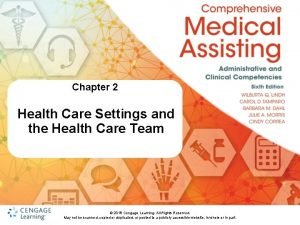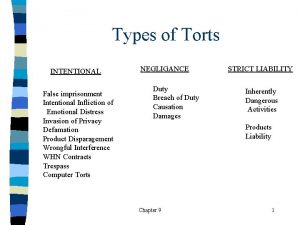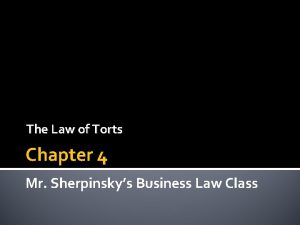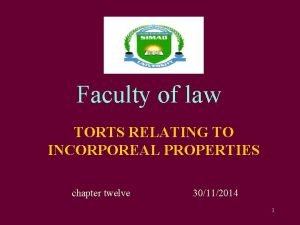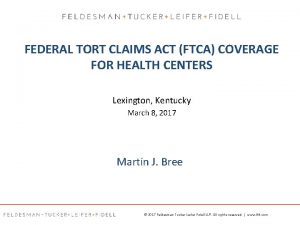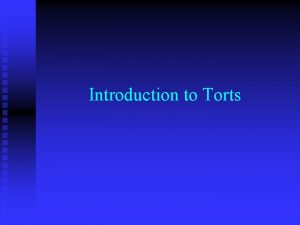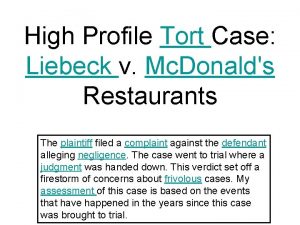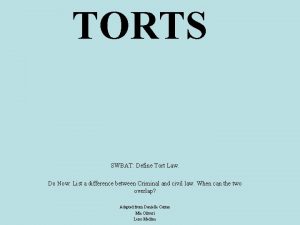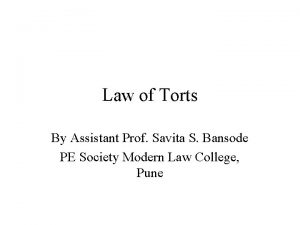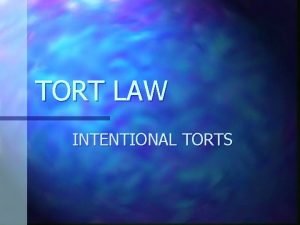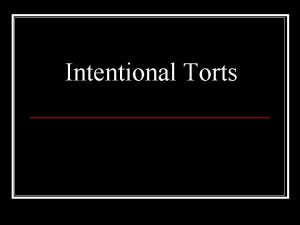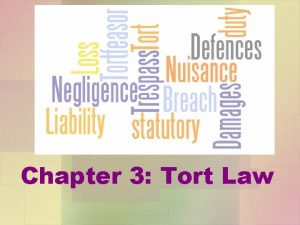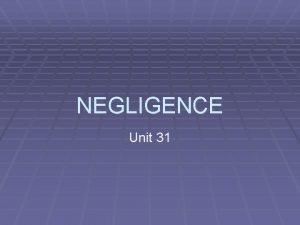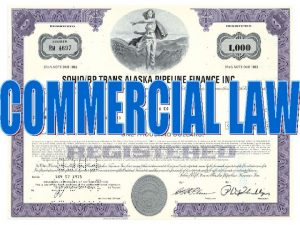TORTS FOR HEALTHCARE Types of Torts A tort












- Slides: 12

TORTS FOR HEALTHCARE

Types of Torts A tort is a wrongful act under civil law not criminal law. Can have overlap between tort and a crime • Intentional v. negligent • Harm to person v. property(not relevant to healthcare)

Intentional Harm To Person Most common type of tort • Assault • Battery • Wrongful Death (homicide) • False Imprisonment • Invasion of privacy • Defamation • Intentional infliction of emotional distress

Assault Reasonable apprehension of Violent injury from Unlawful act of another At time when other has apparent ability to carry out threat • May also be attempt at bodily harm • Assault is the threat not the follow through with the threat • No injuries except emotional distress (fear) so don’t usually see this alone because damages are nominal. • •

Battery Intentional touching Of one person by another Without consent Person includes clothing worn and objects held Presumed consent (crowds at sports events, elevators, crowded hallways, existing relationships with healthcare provider) • Physical injury, medical damages • • •

Wrongful Death • Death of a human being • Caused by intentional act of another • What are the damages, money is calculated by # of years of life expectancy and salary will give you amount (worth). • Suing for loss of income that the person brings to family cannot get emotional distress money unless present at death. • Will not get money for death of a child • Assisted suicide is not wrongful death if there is an advanced directive and you follow them (hydration, food) the provider is not liable

False Imprisonment • Unlawful confinement to bounded area of one person by another for any length of time • Whereby victim is deprived of liberty • Longer they are confined the greater the damages • Psychiatric patients if have appropriate commitment order will not be unlawful (72 hour)

Invasion of Privacy • Public Disclosure of private facts not opinion (most common) • Which are highly offensive and objectionable to reasonable person • And are not matter of public concern (STD info. ) and there is no “need to know” (privilege disclosure) • Also a HIPPA violation • Tort for emotional damages pain and suffering

Defamation • Untruthful statement of fact (if statement opinion or true not defamation) • Published to a third party • Without privilege • Internal privilege (telling supervisor or separation notice with unemployment) • Which injuries reputation of person whom statement was made • Can be written (libel) or spoken (slander) • Damages normally have to be shown but may be presumed • Torts have to show wrongful act occurred and damages occurred

Infliction of emotional distress • Intentional or reckless conduct which is EXTREME AND OUTRAGEOUS and causes SEVERE EMOTIONAL DISTRESS • Extremely hard tort to prove in Georgia • Everyone wants to raise this but very few succeed

Types of Torts • Intentional v. negligent • Harm to person • Very hard to prove intentional acts

Negligence • Failure to perform legal duty (standard of care) which was proximate cause of damages suffered by another • Also the damage was reasonably foreseeable • Malpractice is negligence of a professional • All malpractice is negligence not all negligence is malpractice • Burden of proof higher in a criminal case (beyond a reasonable doubt ) then civil tort (burden of preponderance)
 Tort in healthcare
Tort in healthcare Tort examples in healthcare
Tort examples in healthcare Healthcare and the healthcare team chapter 2
Healthcare and the healthcare team chapter 2 Sports medicine definition
Sports medicine definition Types of tort law
Types of tort law Example of unintentional tort
Example of unintentional tort Torts relating to incorporeal personal property
Torts relating to incorporeal personal property Who needs federal tort claims act coverage
Who needs federal tort claims act coverage Torts class
Torts class Torts case
Torts case Ovenboy7
Ovenboy7 Law of torts
Law of torts Define tort law
Define tort law
